Atomic Heart has a great aesthetic in search of a more interesting game
Or a more silent protagonist, at least.
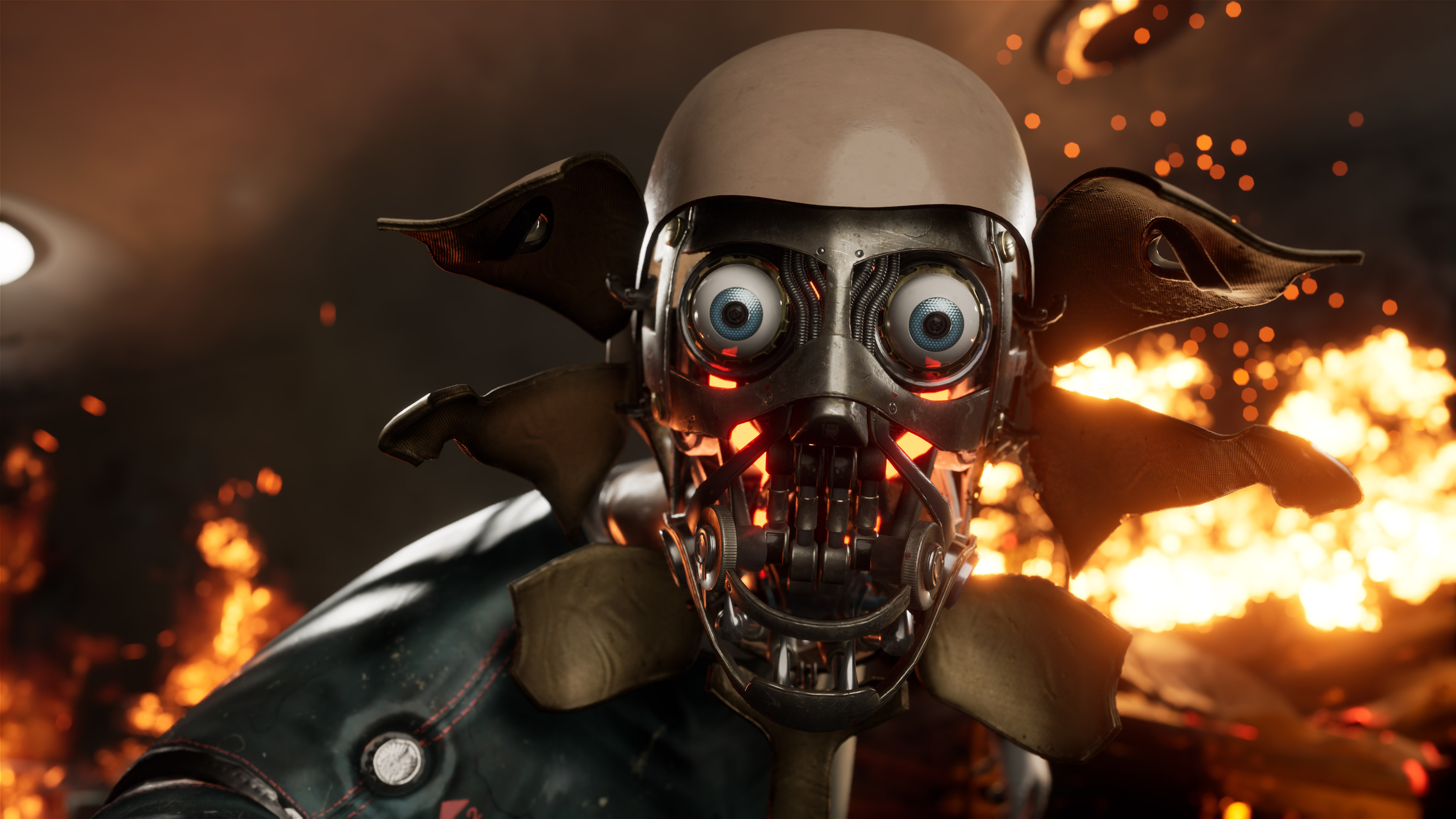
I think it was the second time Atomic Heart's protagonist uttered his quasi-catchphrase—a flabbergasted "Crispy critters!"—that I began to worry that my hopes for the game had been misplaced. An FPS with RPG elements and a lot of immersive sim inspiration, it's been one of the most intriguing games on my radar ever since its first trailer dropped back in 2018, echoing BioShock, Stalker, Nier—basically everything pensive, ambitious, and weird—and locating it all in a retro-future Soviet utopia-gone-awry. Even the soundtrack for those trailers, featuring some of the most potent deployments of Alla Pugacheva since the fall of the Berlin Wall, seemed to promise something that was self-assured and interesting. But having gotten some hands-on time with it, I'm worried Atomic Heart might not be very interesting at all.
Pretty vacant
Let's start with the good stuff: Atomic Heart looks great. Imagine the pomaded, pearly-toothed optimism that we associate with the 1950s USA in our own reality, and transplant it into a world of towering Stalinist skyscrapers and cloyingly-helpful robots. A technological revolution has turned the USSR into a seemingly-uncontested global hegemon in the game's version of 1955, and everyone's having a grand old time while an android workforce—whose designs range from standard uncanny valley humanoid fare to shambling, pot-bellied things reminiscent of that 2005 Hitchhiker's Guide to the Galaxy film—does all the actual labour. The trailers weren't lying, the game really is impressively visually creative.
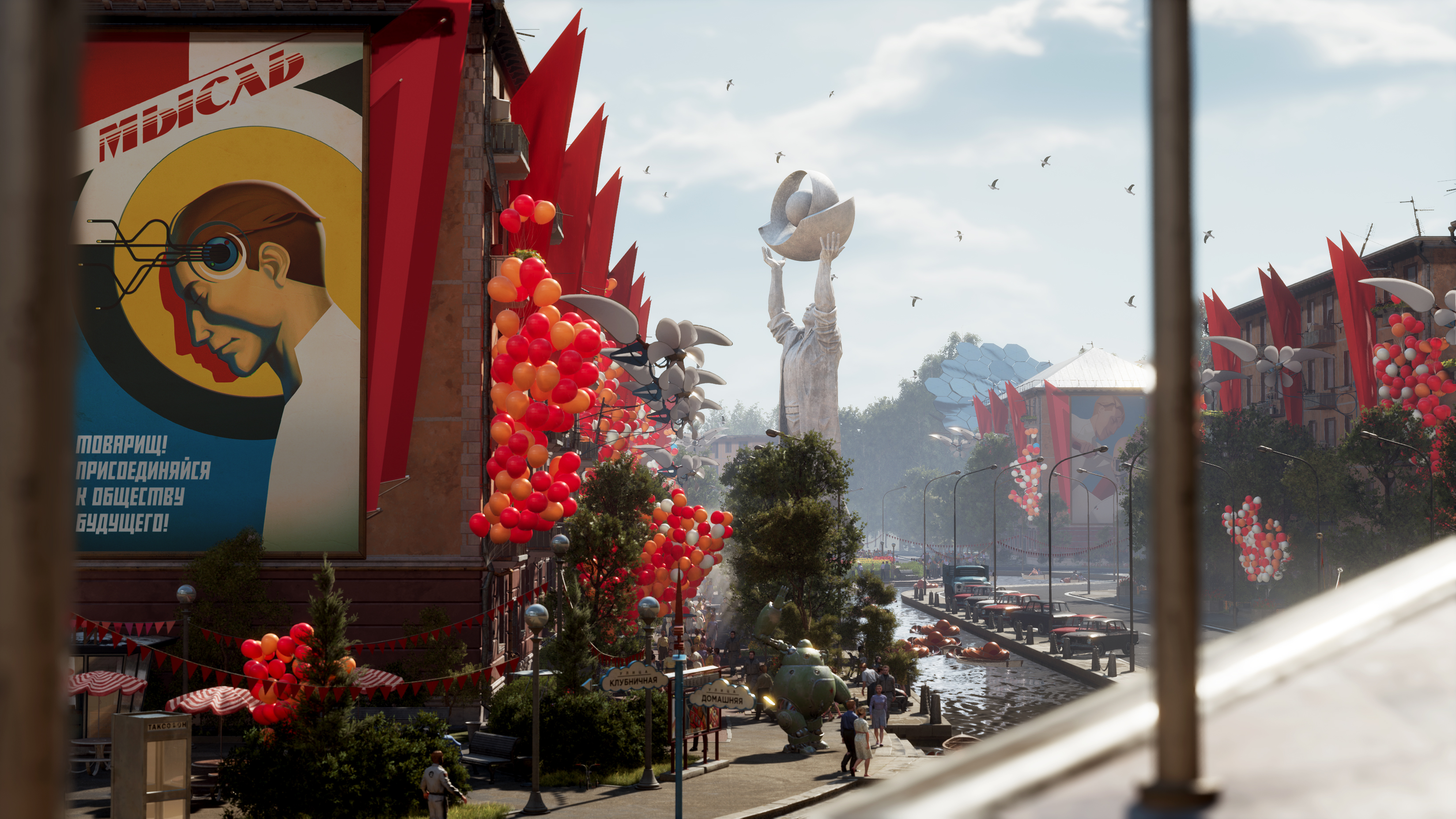
But as exciting as Atomic Heart looks, I never got the impression the game was ever going to find much to actually say about a lot of this stuff. As a game from a Russian studio that draws obvious inspiration from BioShock, I'd gone into Atomic Heart with high hopes for some unique historical reflection. But outside of a few stale social credit jokes, the game never really seems to have much interest in the actual Soviet Union as anything other than a source of immediately-recognisable visual weirdness. Nu, Pogodi! plays in the game's save rooms (an oddly Resident Evil-ish touch) and random Soviet propaganda posters deck the ruined halls of facility 3826, but they only feel like easter eggs for those of us nerdy enough to care. From what I've played, it's disappointingly uninterested in historical Soviet socialism.
It is interested in comedy, though, which I can't say I was expecting. Whether it's the rocket-launcher-toting grandma or the tediously horny weapons upgrade robot that turns every interaction into an extended gag about 'inserting' materials, Atomic Heart is inescapably zany. A lot of the humour comes from the player character, Major Nechaev, and his AI companion Charles. The pair have a kind of comedy double-act thing going on, with Charles the exasperated straight man to Nechaev's quippy protagonist. Before I was even five minutes into playing, I innocently interacted with a phone booth and was baffled to find myself engaged in a scene in which Nechaev asked a stranger on the other end of the line if they had Prince Albert in a can. Charles was not amused.
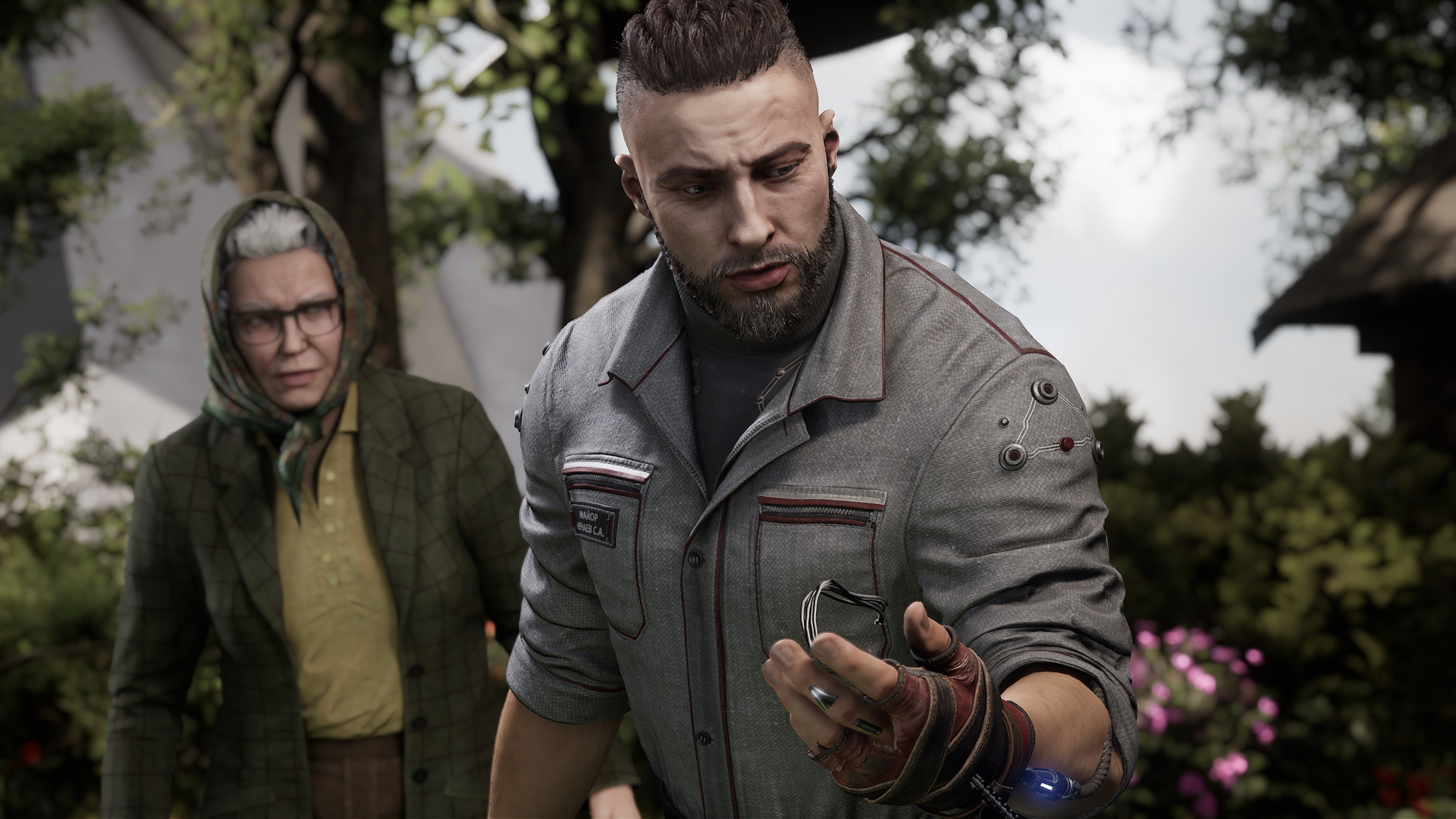
Nu, Pogodi! plays in the game's save rooms and random Soviet propaganda posters deck the ruined halls of facility 3826, but they only feel like easter eggs for those of us nerdy enough to care
Neither was I, which was a much bigger problem for me personally. The focus is on humour over Disco Elysium-style meditations on the promises, successes and failures of the October Revolution, but the comedy doesn't land, leaving me with very little to really care about. Nechaev and his endless quips—plus multiple awkward lines like "Crispy critters" and "What in the sweaty hell"—feel like bizarre transplants from an FPS that would have come out 15 years ago, right down to the bouts of edgy swearing and mysterious amnesia. It's tired, familiar, and most fatally of all, like it was trying to be funny.
Immersive sin
But maybe none of that stuff matters to you at all. Maybe all you care about is reading other people's emails, a passion I both respect and share. In that case, how does Atomic Heart—which invoked the sacred 0451 code within about 30 seconds of me hitting 'Go'—hold up as an immersive sim?
My time with the game was divided into two parts: a few hours in a fairly linear intro section and one hour to muck about in the open world. The intro section is pure BioShock: a little room for exploration, with material and story rewards (emails and audio logs of the 'something's up with the robots' and 'argh the robots are killing me' variety) for players diligent enough to poke their noses into every nook and cranny, but mostly a series of corridors that funnel you inexorably through the plot.
The biggest gaming news, reviews and hardware deals
Keep up to date with the most important stories and the best deals, as picked by the PC Gamer team.
Well, kind of inexorably. Those corridors are filled with robots run amok, and while stealth is an option, your enemies have formidable lines-of-sight and an irritating tendency to get hung up on their patrol routes and spin around, spotting you as you sneak up for a kill, so progress ends up feeling very exorable indeed.
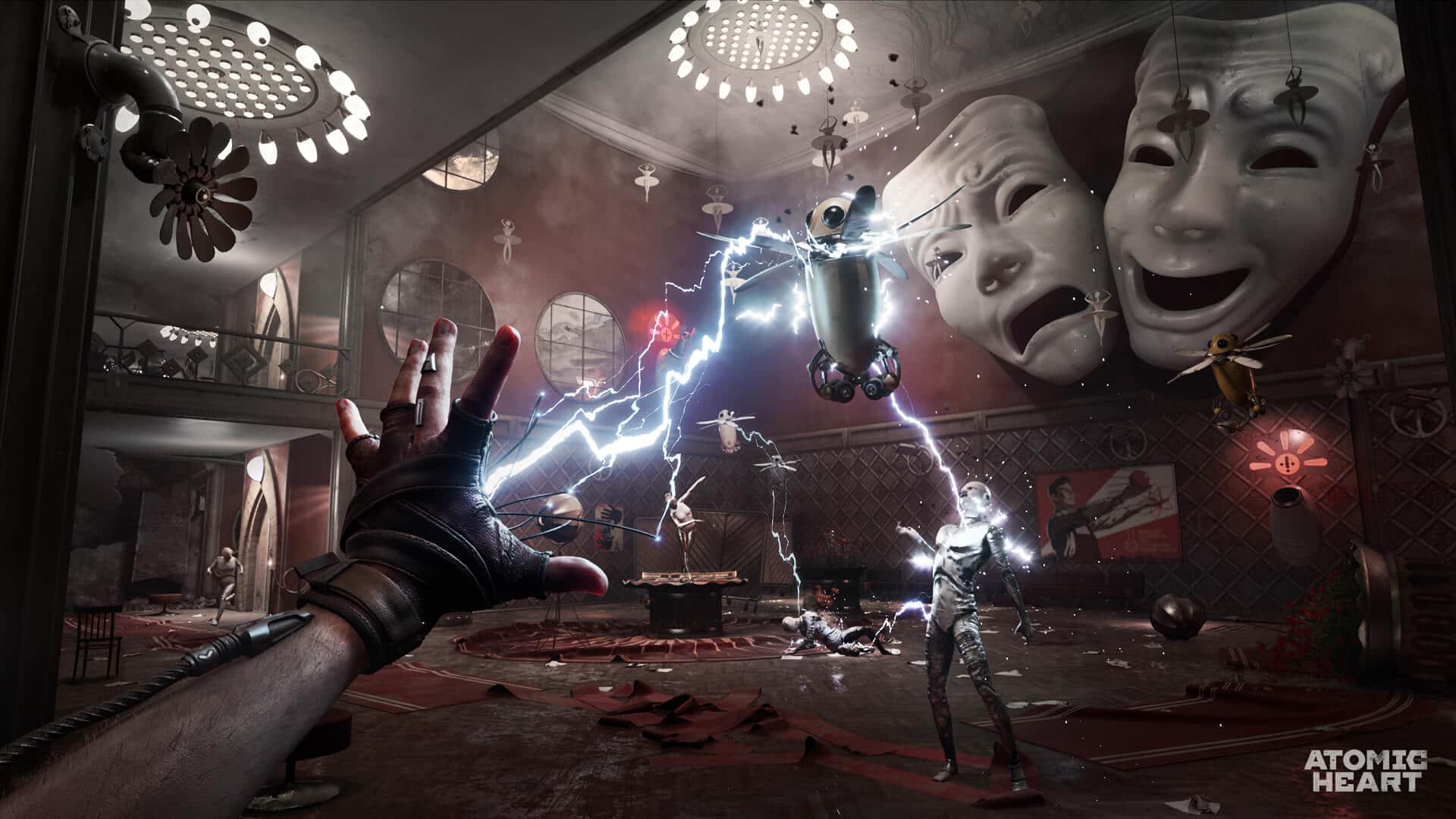
I never felt like I had the tools to develop a creative solution to this, and I hadn't unlocked enough of the game's numerous weapon and ability upgrades to make combat encounters shorter. I was stuck in a loop of attempting stealth, failing, and becoming embroiled in a lengthy melee with one or more spongy androids. Sometimes, a strategically-placed vent would let me avoid a camera or bypass an enemy, but I still found myself going toe-to-toe more often, and for much longer, than I would have liked. The devs tell me I was playing on normal, and that the full release will feature an easier mode for players who don't want to spend quite so much time braining androids. If it cuts down on the length of these fights, I'm eager to try it already.
That changes when you get to the open world. You have more tools and powers at your disposal, and the rolling green plain of the overworld offers the exciting new possibility of simply running away from your problems. At this point, you're free to ignore your main quest for a bit, you can just drop a waypoint on an interesting-looking spot on the map and go check it out. I opted to investigate a disused science lab that turned out to be a collection of platforming puzzles that had you using your powers to raise and lower platforms. It was a necessary respite from combat, and it also led me to discover that the Soviets of Atomic Heart have used quantum radios to invent house music in 1955. Who says communism doesn't work?
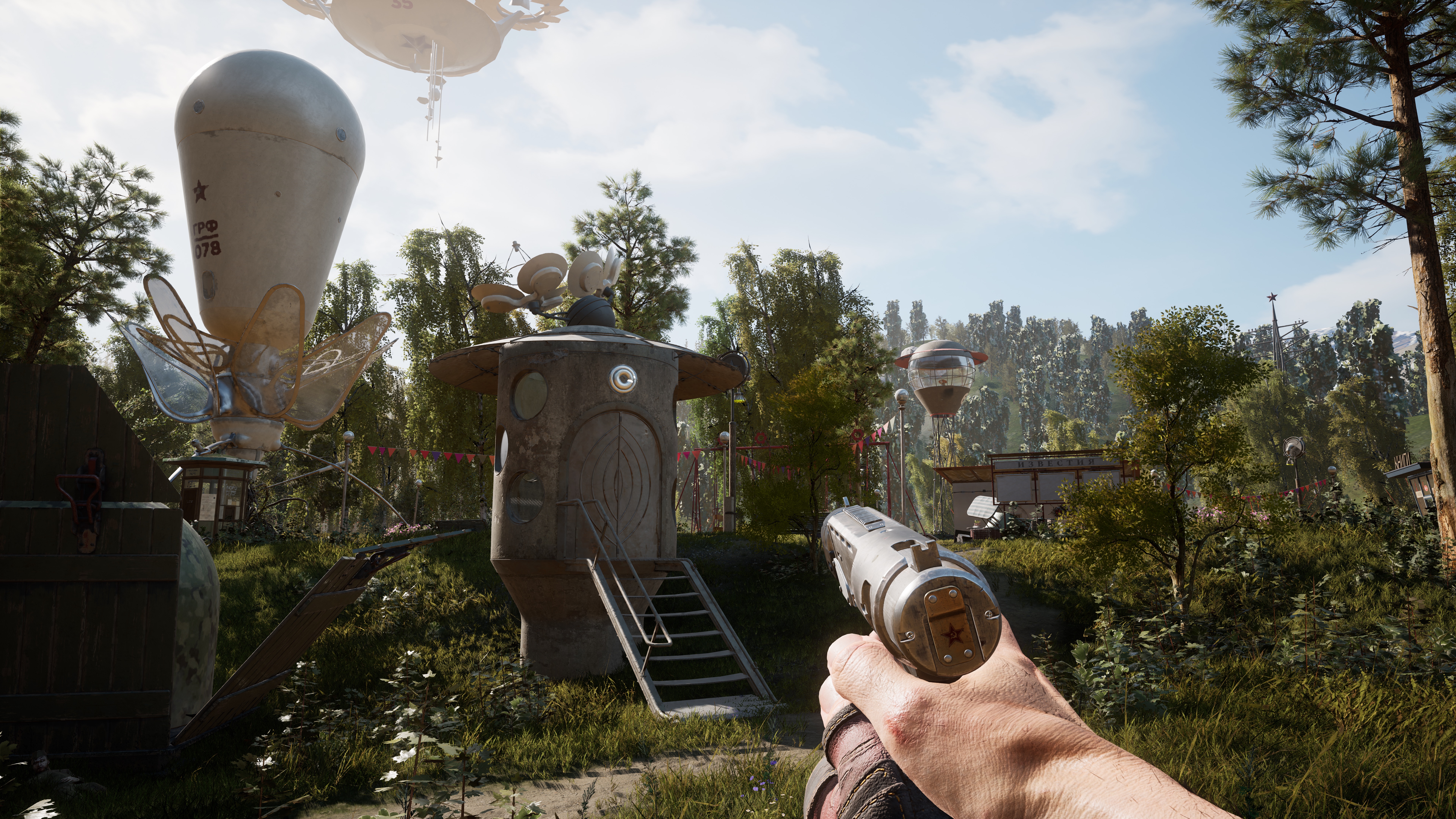
The open world didn't let me get quite as creative as I would have liked, however, and is missing the magic of Prey or Dishonored—games that let me dream up schemes using their systems that the devs never intended. There's still fun to be had with goo, though. You can coat enemies with the stuff, which can then be afflicted or altered with elemental damage—fire turns to napalm, cryokinesis freezes enemies solid, and so on—from either upgraded weapons or the BioShock 2-style powers you can fling with your left hand.
Give me a reason
Mostly, though, I just accrued huge trains of angry robots that pursued me around the map as I went about my business. There wasn't much point in engaging them and I wasn't really interested in doing so after spending ten minutes seeing what power combos I could come up with. Even the demo's final boss, the great big scary ball you might remember from some of the trailers, didn't require much creativity on my part. Lure it into crashing—classic boss-fight toreador style—and empty clip after clip into it. Job done.
Atomic Heart's narrative didn't hook me, its humour fell flat, and its gameplay—for all the brilliant and beautiful influences it wears on its sleeve—never offered the flexibility I really want from an immersive sim. I've only played about four hours, 10% of the 40-or-so hour total that the devs tell me will make up the final game, and it's always possible that a narrative or gameplay twist could occur later on that finally grabs me. But right now, Atomic Heart seems like a great set of visuals trapped in a game that doesn't live up to them, and I'm left feeling colder than Siberian snow.
Atomic Heart releases on February 21 on Steam and the Microsoft Store. It's a day one Game Pass title, too.

One of Josh's first memories is of playing Quake 2 on the family computer when he was much too young to be doing that, and he's been irreparably game-brained ever since. His writing has been featured in Vice, Fanbyte, and the Financial Times. He'll play pretty much anything, and has written far too much on everything from visual novels to Assassin's Creed. His most profound loves are for CRPGs, immersive sims, and any game whose ambition outstrips its budget. He thinks you're all far too mean about Deus Ex: Invisible War.

